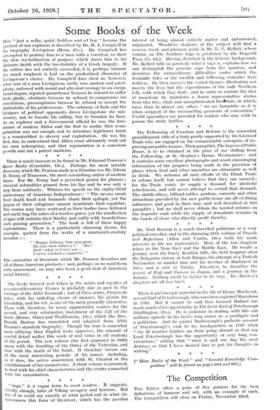Some Books of the Week
}tow- "just a sulky, quiet, feckless sort of boy" became the greatest of our explorers is described by Dr. R. J. Campbell in his biography Livingstone (Berm, 21s.). - Dr. Campbell has
attempted to portray him as a man with a vocation, to show: the slow crystallization of purpose which' drove him to his
ultimate death With the inevitability of a Greek tragedy. If the author has not entirely succeeded, it i, perhaps, because' too much emphasis is laid on the predestined character of Livingstone's choice. Dr. Campbell does show us, hOwever, what sort of a man Livingstone really was, austere and preci- pitate, endowed with moral and physical courage to an excep- tional degree, reputed quarrelsome because he refused to suffer fools gladly, obstinate because he refused to compromise his convictions, presumptuous because he refused to accept the-- shibboleths of his predecessors. The calumny of fools and the intrigues of political opponents drove Livingstone the mis- sionary, not to forsake his calling, but to broaden its base. As an explorer and a Government official he was the fore- ranner of modern Africa and the first to realize that evan- gelization was not enough, and to introduce legitimate trade as a counterblast to slavery and exploitation. He was the first, too, to understand that Africa must ultimately work out her own redemption, and that regeneration is a conscious growth and not a patent medicine.


















































 Previous page
Previous page